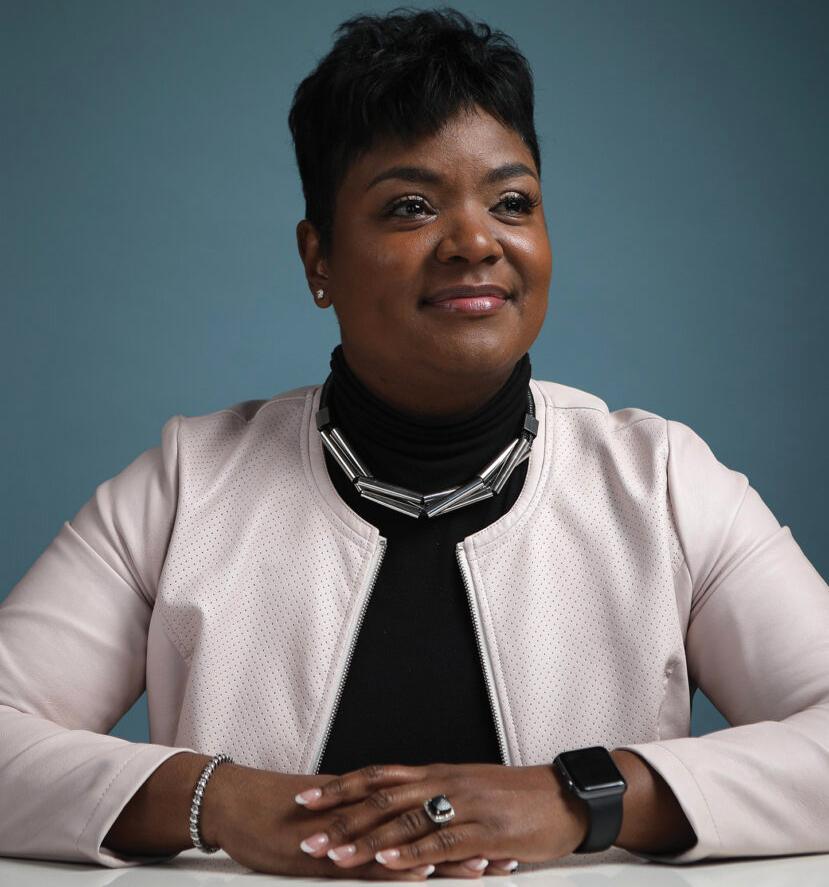
By Anne Marshall | Photos by Jessica Ebelhar
The Norton Healthcare Sports and Learning Center, at 30th Street and West Muhammad Ali Boulevard, opened this month, February 2021. The Louisville Urban League, led by president and CEO Sadiqa Reynolds, raised $43 million and borrowed $10 million more to cover the cost. Back in 2017, in this Louisville Magazine profile of Reynolds, Anne Marshall wrote, “Lifting west Louisville, creating jobs, stealing a bit of downtown’s thunder — that’s another part of her plan. And in August 2016, when a tentative FoodPort project in the Russell neighborhood was scrapped, Reynolds prayed on it. What would benefit that community? What would lure folks to west Louisville at all hours of the day? One night, she opened her eyes from praying and there on the television was sprinter Usain Bolt, his spindly gazelle legs making victory look breezy. Aha.”
On a hazy, 90-degree day in August, Sadiqa Reynolds sits straight-backed on a light-gray chair, cushioned like a couch, tall like a barstool. In a ruby-red satin blouse, a black suit and glossy fuchsia lipstick, Reynolds folds her hands in her lap, not a speck of jitters, just a calm conviction that doesn’t loosen at the seams or soften in certain crowds. There’s no back alley to her truth. It’s raw and available, ready for an audience of Make America Great Again-leaning viewers. It will be a sprint — six minutes and 16 seconds on The Story with Martha MacCallum on Fox News.
The Kentucky State Fair is the show’s temporary studio for the day. A blue and purple dragon twirls behind the host’s left shoulder; a Ferris wheel nearly grazes her right. She plays clips from fairgoers who defend Confederate monuments. “Someone’s offended by every different type of statue. It’s crazy,” says a blond woman with a shrug. A middle-aged man with a gray buzz cut says, “That is history. Leave history alone.”
MacCallum makes introductions. “Republican Congressman Thomas Massie has represented Kentucky for five years, and Sadiqa Reynolds is president and CEO of the Louisville Urban League.” Reynolds and Massie sit side by side, both 40-something, smiling polite grins that reveal matching dimples. This show is airing a little more than a week after the violent protests in Charlottesville, Virginia, when white supremacists marched to protect a statue of Confederate icon Robert E. Lee and clashed with anti-racist protestors. When a white supremacist plowed his car into those protestors, one woman was killed.
“Sadiqa, let me start with you,” MacCallum says. Massie, a well-educated engineer of Tea Party stock who lives on a cattle farm and whose district includes the area across the river from Cincinnati, turns to listen to Reynolds, a well-educated former criminal-defense attorney and judge, born in the South Bronx, raised by a single mother who moved to Kentucky after a painful chapter of life. “I think that Black people have never been guilty of attempting to sanitize history,” Reynolds begins. “But these folks who have erected these statues to celebrate people who were murderers, who were treasonous, who were willing to die in order to save slavery. …” Reynolds doesn’t flinch at a good verbal joust; she was a lawyer years before she set foot in law school. “It’s almost as if . . . they wish the South had won.”
She’s devouring airtime like Thanksgiving dinner. “So the idea that we are the ones who are attempting to change history? It is absolutely insane.”
She could let Massie have his take.
“But one more thing — you don’t have to have a memorial or a statue to be able to teach history.”
Reynolds packs energy. And she’s a pinball by choice — work, family, work, family, church on Sunday, and so on. A young lawyer, Monet Duke, whom Reynolds mentored some 15 years ago, remembers chasing Reynolds, a streak of pantsuits and high heels click-clacking through crosswalks, down sidewalks, up courthouse steps, to the courtroom.
About a minute into the Fox News segment, Reynolds pushes on. “People have dehumanized Black people and the Black experience so much that there is no ability to see what kind of damage something like this can cause.”
Duke, who now lives in Texas, left work early so she could catch the “fierce” woman who inspired her back when she was a Shawnee High School student weathering personal chaos — siblings in foster care, a neglectful parent. “It was amazing to see someone so young, a woman who was Black, who had a legal career. When you see that, it reinforces that I can do that too,” Duke recalls.
With a few seconds to go, Massie and MacCallum reflect: Where does it end? Thomas Jefferson? George Washington?
Reynolds: “We are a part of this country and deserve to have respect. When we walk through the streets, we should not see monuments like that.”
Fifteen seconds left.
Massie: “It’s a slippery slope.”
Reynolds: “Slide down.”
Slide down. Two words that stick — stickier than double-stick tape. Two words that anyone who watched this segment will remember as Sadiqa Reynolds’ “slide down” moment. It’s an invitation. A push. Tumble down that slippery slope. Does it hurt? Let’s slip farther, subterranean, into centuries past, into the bones, into the marrow of this country that’s so splintered. Slide down.
Sadiqa Reynolds was born Sadiqa Noni Moore at the Bronx-Lebanon Hospital on Jan. 30, 1970-something. (Age, the one place she opts out of openness. Me: “You mind sharing what year you were born?” Reynolds: “Yes! I mind.”) Her mother, Sandi Lowrance, was young, early 20s. Lowrance gave Sadiqa, her only child, dark brown eyes and skin, a pretty smile. Though her daughter received a bonus: one deep dimple in her right cheek, like an asterisk.
An only child, Reynolds spent her first years in the South Bronx surrounded by aunts and uncles (her mother was one of seven children), cousins and half-siblings that her father brought to the marriage. A boisterous, opinionated crew. She lived in a brick high-rise with a candy store on the first floor, New York’s carousel of noise — sirens, music, traffic, fighting, laughter — forever looping.
Reynolds delighted her family. She was a true cut-up, grabbing a comb and singing into it, always entertaining. “I could sit back and watch her all day,” her uncle Barry Daniels recalls. Her aunt Wendy Braxton animates when reliving her niece’s routine to the song “Kung Fu Fighting.” Play it again! Play it again! “It was so funny,” she says. “Put ‘Kung Fu Fighting’ in this (story), please.” (One day, Reynolds shows me a picture of herself in a jumpsuit, one tiny leg kicked up, mid-routine, her family belly-laughing in the background.)
When Reynolds was around the age of 5, it came time to leave New York. It was Palm Sunday. Dried palms from church were strewn about her aunt’s apartment. There was Lowrance, lying on her sister’s velvety lime-green couch, battered and swollen, totally unrecognizable. “My aunt gave me this ridiculous story saying my father threw a cup at my mother,” Reynolds says, tears welling. “My father was extremely abusive to my mother. My mother was a social worker. Here she is, helping all these other people, but she’s not in a position to help herself.” The abuse had been going on for some time. But that Palm Sunday was the last of it. Reynolds’ father went to prison. (He’s still alive, but Reynolds says they do not have a relationship.) Her mom headed for Lexington, Kentucky, where her best friend lived. She wanted a fresh start, a better environment for the little girl she adored. “The sun rose and set on that child,” Braxton says.
It’s impossible to tell the story of Sadiqa Reynolds without visiting the intimate universe created between a mother and her only daughter. The two mirrored each other, family members say, part granite, part raw and sensitive. Lowrance’s father died when she was just 9 or 10 years old. “I’ll never forget her telling this story: She walked into the funeral home and fainted,” Reynolds recalls. Overcome by sadness, Lowrance had to disappear.
“I think a lot about the courage it took for my mother to leave her family in New York,” Reynolds writes in an email to me one day. “She left with only one suitcase.” When Lowrance got to Kentucky, she eventually got hired at the GTE telephone company as an operator. “When I was in first grade I was a latchkey kid,” Reynolds recalls. “I would go home and I had to stay in the house until she got home. I would just dial zero and ask to speak to my mother.” Lowrance was promoted into management and Reynolds remembers her mentoring younger folks trying to move up, inviting them to their apartment so she could help them prep for interviews.
In high school, she took her mom’s car without asking. As punishment, Reynolds had to walk everywhere for two weeks, even to her job at Burger King — a 10-minute, stuffy, sweaty walk. “You have no idea how hot that polyester suit was!” Reynolds recalls. Lowrance was firm with her daughter, quick with consequences. “She wanted me to be the best,” Reynolds says. In the ninth grade, at a school in Durham, North Carolina, where the two lived for five years, a girl called Reynolds a “nigger” and slapped her in the face. “Unfortunately, I beat her up,” she says. “I was suspended for 10 days.” Lowrance cried and cried. Reynolds remembers her mother’s words clearly. “She said, ‘They want you to fail. You will not fail. You will do all your work and you will go back to that school.’ She called a tutoring service and hired a tutor for every day that I was out. She said, ‘I don’t know where I’ll get the money, but you will not fail.’” Lowrance couldn’t let it go there. She was angry that her daughter who was defending herself from a racist was suspended. As Reynolds remembers it, her mother walked up to the principal, who was a Black man, and called him a “useless Uncle Tom.”
Reynolds and her mom moved back to Lexington and she graduated from high school at 16 years old. Her first night at the University of Louisville, she drove home. It happened a lot that first year. She had moved homes a lot as a kid, three times in Lexington alone, so she was conditioned for new walls, new smells, new noises creeping in an open window. But not even a silhouette of her mom — that was difficult.
Reynolds joined a sorority and “figured out college life.” Her junior year she was nominated to U of L’s homecoming court. She worked two or three jobs sometimes — Showcase Cinemas, Chi-Chi’s cocktail waitress, resident assistant, even a gig with the FDA (she was hired as a decoy and would try to buy beer with food stamps). In 1993 she graduated with a bachelor’s degree in psychology and went on to law school at the University of Kentucky.
All the while, Lowrance had depression, suffering mostly in private. She hid it well. Not everyone knew how seriously she struggled with the disease. When Reynolds was 25, shortly after finishing law school, her mother committed suicide. “There is no more painful death than suicide,” she says, “because you live the rest of life wondering if you could have said something.”
Reynolds writes to me in an email one day. “In my case, I think my mother thought I was stronger than I actually am. She couldn’t possibly have known how lonely I would be without her. Nothing good happens that I don’t need her.”
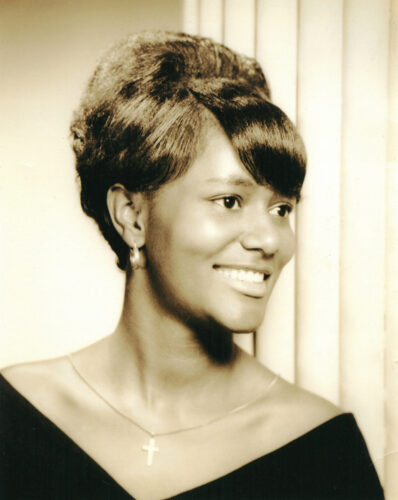
Reynolds likes to tell the story of her first track race in elementary school. She was in fourth or fifth grade. She had never dashed for a finish line in her life. But a coach at a community center she hung out at encouraged her to try it out. She won her first race, the 100-meter dash. “I went from not knowing anybody on the bus to being a star in one day,” she recalls. “Just from winning a race. Oh, man, you can run? It was a game-changer.” She went on to compete in junior high and even won the “most athletic award” in the sixth grade.
That esteem boost is in the DNA of the Urban League’s track project. While young kids may not be the ones competing on it, Reynolds sees it as an “educational carrot,” something to inspire children. “You don’t have kids with high absenteeism running track,” she explains. “We need to see winners. We watch the news. You see so many negative images for brown and Black people. We need heroes.”
So you’d think on the day after the press announcement, Reynolds would be floating. Everyone who spots her offers congratulations. She has an 81-year-old aunt wanting a VHS copy of the press conference. When she walks into a boardroom for a meeting, cheers nearly rattle the walls. “Get your track shoes on!” someone yells. She smiles. The dimple sparkles. But later she’ll say, “I can’t get happy like I want to. I’m just not there. I’m so emotional. You just don’t want to let anybody down. So immediately comes the stress.”
Reynolds often does this thing when she knows she’s in the news. She skims the whole in search of the negative. For that guy on WDRB, a business owner in west Louisville who basically says: I’ll believe it when I see it. Or that post in the comments section: Jobs? This won’t bring jobs. Or the tweet that states, “I would think housing should have been a priority over a track and field facility.” It stings.
“If she had 80 people tell her that was great and two people that said it wasn’t great, she’d focus on those two people,” Keith Reynolds says. The two met on a blind date and were married for more than a decade. They divorced last year and remain close friends. (Or as she joked one day: “He adoooores me. Just don’t talk to him for more than 10 minutes. He is my ex.”) Keith says Sadiqa has always taken criticism hard. Maybe, he thinks, it’s because she was an only child, no siblings to toughen her up. Maybe it’s because her heart leads her charge.
Keith remembers how, when Sadiqa was a criminal-defense attorney, she’d meet with clients on weekends and bring them food, furniture, whatever they needed. “I was like, ‘Do lawyers really do this?’” he recalls. In 2009, she was appointed as a Jefferson County district court judge. A year later, she campaigned to keep her seat on the bench and lost. (Gina Calvert won with 55 percent of the vote.) Disappointment consumed her. She felt she had let her supporters down. That was a Tuesday. “On Thursday we were on our way to Disneyland,” Keith says. A seven-day Disney cruise with their girls. No phone service. No one knew her. No one had seen the ticker at the bottom of the television documenting her loss. It was perfect.
Reynolds’ most difficult year professionally may have been 2014, when she was working in the mayor’s office as chief of community building, essentially deputy mayor. Her job included overseeing eight metro departments, including Louisville Metro Animal Services. The controversy is a saga within a story, but for this story: Basically, a pit bull that should’ve received surgery didn’t get it. The dog, Sadie, was euthanized. Reynolds and other LMAS staff were grilled — hours of special Metro Council hearings led by Democrat Cindi Fowler and Republican Kelly Downard. There were blog posts with titles like, “Sadiqa Reynolds: The Reason LMAS is a Disaster.” A council investigation found Reynolds’ investigation into the dog’s illness and death inadequate and improperly documented.
Reynolds calls the whole ordeal “horrible, traumatizing.” She had done some good work, like drastically improving the live-release rate. But Sadie’s death fueled outrage. “I don’t have thick skin,” Reynolds says, adding that it’s growing thicker. “I don’t know how I do this. I think it’s when people question my motivation. Are you fucking kidding me? You been paying attention?”
Since the September press conference, the track and field project has gained momentum and support. Stephen Reily and Caroline Heine, co-founder and project director of the FoodPort, have shared heaps of environmental reports, maps and documents that can help the Urban League learn about the site. The Louisville Sports Commission is behind the idea.
The Urban League doesn’t have any dedicated money from the city yet. But Mayor Fischer, who’s up for reelection in 2018, did stand at the podium with Reynolds and applaud the project. “Money talks. So I’ll tell you when I get some,” Reynolds says one day. “I believe (the city) wants this. Nobody in office wants to be tied to something that fails.” (Metro Council did just approve a $30-million bond to help build a soccer stadium in Butchertown, but Reynolds doesn’t think that will affect the city’s support of the track and field facility.)
A key mentor for Reynolds in this project is Valle Jones, a longtime real estate developer who revamped five historic buildings on Whiskey Row. “Some people have the ability, but not the vision,” Jones says. “Some people can have the vision but not the right stuff. (Reynolds) has both. (But) it is scary when you have a big vision and you see something that other people haven’t seen. You’re stepping out on a ledge. That doesn’t mean that it’s not the exactly right thing to do.”
Reynolds really wants to make the city proud. And right now she knows some folks are skeptics, especially because the Urban League has never tackled such a project. “I have the ability to pull people together,” Reynolds says. “I don’t want to pretend I’m an expert on bonding. But I do want experts.” She snagged Jim Host (of KFC Yum! Center fame) to work for her. For $1 a year. Let him navigate that snarly web of bonding and financing. Reynolds has a project manager too. And, yes, these are just first steps. But they’re steps nonetheless. Reynolds is focused — this track is happening. She wants west Louisville to feel a bit taller and stronger when this is all said and done. Like any daughter, she wants her mom to be proud. At the press conference on the morning of Sept. 19, Reynolds spoke of how, when she got the news from Mayor Fischer’s office about the Urban League’s winning proposal, she tried to call her person, the one who pushed and believed in her.
“My mother passed many, many years ago,” she said. “Yesterday was so good I picked up the phone to call her. I just forgot.”
Reynolds pauses, holding back tears.
“This is going to be amazing,” she said before walking away from the podium.
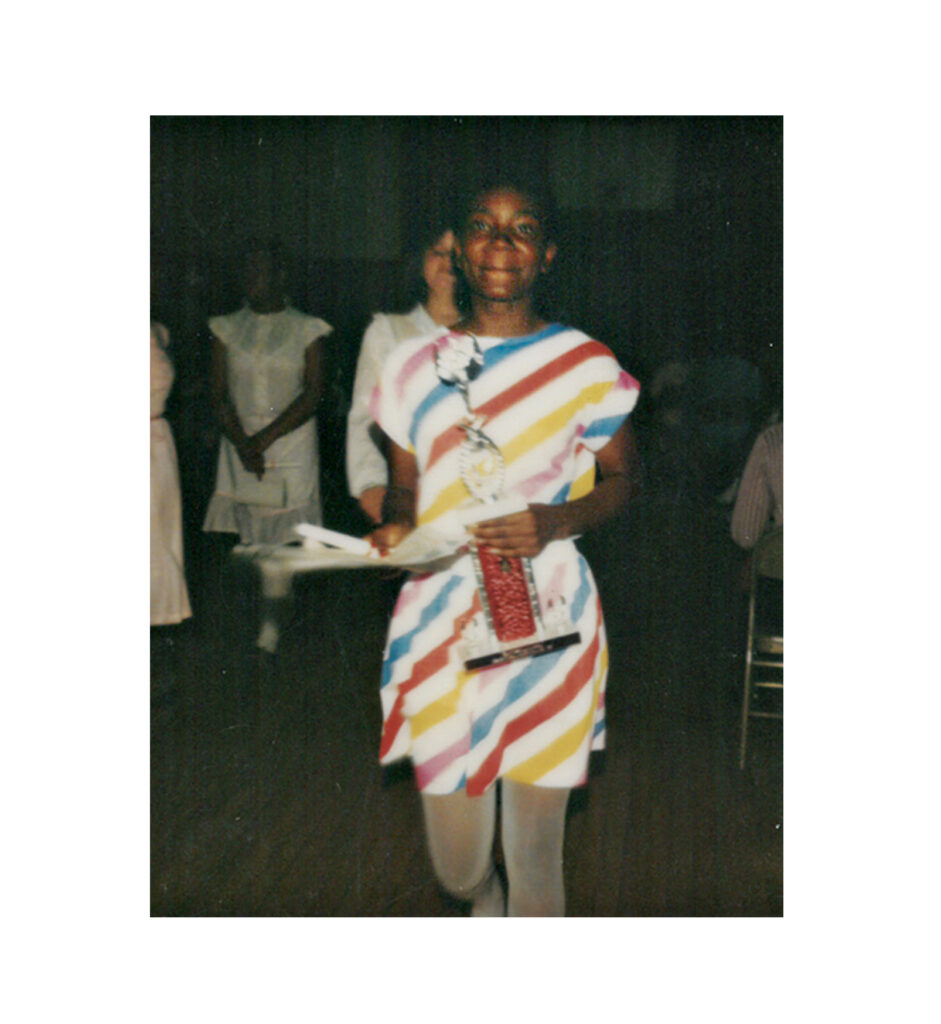
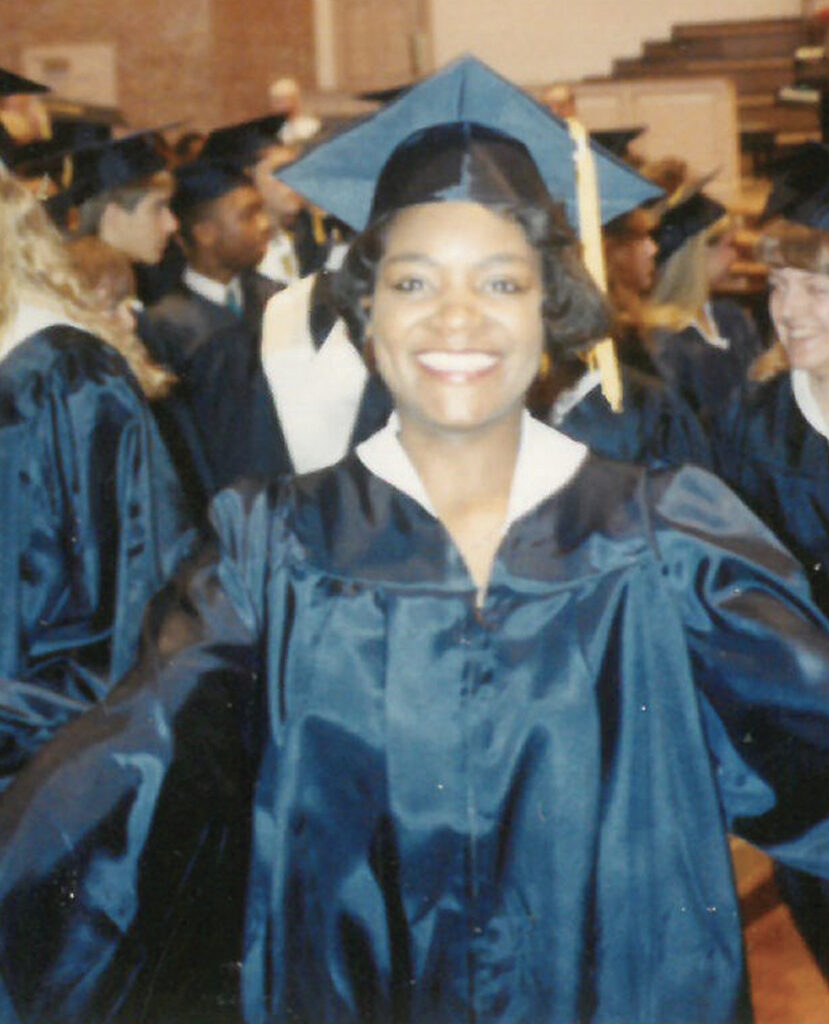
In 2015, Reynolds landed her “dream job.” The Louisville Urban League’s board of directors chose her out of a pool of candidates from across the nation. She became the organization’s first female president and CEO, replacing Ben Richmond, a much-admired leader who retired after 29 years. When she heard about his retirement, she started telling everyone, “I’m going to get this job.” (One of the first people she had to tell was Mayor Fischer, who was her boss at the time.)
First, some cosmetic changes to the building, a “woman’s touch,” she says. The lobby now has Pergo floors instead of tile, a more open floor plan and a large television playing TED Talks or CNN. “So people can be educated,” she says. Often this lobby is the first stop for individuals looking to fill out applications for UPS or other jobs online. In the late afternoon, teens walk through on their way to after-school clubs that focus on college applications and financial aid. In the evening, people gather for the Urban League’s homeownership programming.
The lobby, that’s one change. Reynolds’ style, that’s the heavy overhaul. Richmond had a thoughtful, measured way. What Reynolds feels, she says. She owns a T-shirt with this message: “I’ve got a good heart, but this mouth …” A lot of people appreciate that style, that eagerness to advocate for a community that’s often overlooked. “What makes Sadiqa such an asset to the Black community is that she is not incidentally Black,” says the Rev. Kevin Cosby of St. Stephen Church on 15th Street. “She is intentionally Black and unapologetically Black.” She frequently speaks on topics like the need for reparations and the hypocrisy of the drug epidemic, how Black crack addicts were imprisoned while white heroin addicts now get Narcan to reverse the effects of an overdose.
Her style can occasionally frustrate. One night I attend an event at the Kingdom Fellowship Christian Life Center, a church on East Broadway. Reynolds acts as moderator for a discussion on race and Christianity between the African-American pastor of Kingdom Fellowship and a white pastor from a Bullitt County church. At the end of the night, the white pastor starts talking of being touched by hymns written by slaves. “There will be justice. It may not be in this lifetime. So pray for boldness,” he says.
Reynolds: “I have to say, Black people are not interested in justice when we die. Hope is not enough. … There must be something to happen so that people of God will demand justice immediately. We are up to here.” She lifts her hand above her head and continues. All night, an older African-American gentleman behind me has rustled and sighed at some of Reynolds’ comments. At this, he whispers, “Why’d she have to go and do that?” I can only assume he had wanted the night to end on a conciliatory, united note.
Shortly after Reynolds started at the Urban League, she wrote an op-ed in the Courier-Journal supporting a judge’s right to dismiss a jury due to lack of diversity. She says two board members voiced concern, telling her that “wasn’t the role of the league.” The board has had some turnover since her arrival, though that’s not unusual when new leadership takes over a large organization. “The board that hires you is not your board,” Reynolds says. (Richmond, for the record, is a fan: “She brings passion and compassion to the work.”)
The trickier dynamic lies in Reynolds’ dual role: fundraiser and advocate. The Louisville Urban League serves 12,000 people with its wide range of health, education and employment programming. As a nonprofit, LUL relies on private donations, business donations, grants and government funds. Fundraisers typically don’t want to ruffle the public. “We see people kind of get ahead because they’ve been willing to go along to get along,” says Ricky Jones, a friend and the head of U of L’s Pan-African Studies Department. “And, very frankly, across lines of race, the politics of fear is always in effect. I think she’s in a small group of people who are not willing to bow to that.”
In late October, Reynolds saw a Facebook post that upset her. Yvette Gentry, who took over for Reynolds in the mayor’s office when she left for the Urban League, had recently retired and wrote a long post following a string of juveniles being murdered. Gentry and Reynolds have known each other for about 20 years, since “I was a young cop and she was a fiery public defender,” Gentry recalls. On opposing sides then, the two are now friends. In her post, Gentry listed multiple agencies that had received little to no funding in the city’s latest budget. “In total the proposed $660,000 to these support organizations that helped reduce shootings by 20 percent for the first six months of the year were taken out of the equation. This is a drop in the bucket compared to the city’s overall budget,” she wrote. She mentioned a specific councilwoman, South End Democrat Cindi Fowler, saying that she did not fill her budget requests as a retaliatory act. (When contacted, Fowler said her decision was based on a lack of data showing the programs were having an impact.)
Reynolds wrote back: “They damn near killed me. Cindi Fowler cares more about a dog than any child in our community… Sometimes it’s personal because we make too much noise. Whatever you need — I’m here.”
I ask Reynolds about it a few weeks later. I wonder if she had any hesitation before posting her response. “It’s hard in my position. I don’t want to burn bridges with the council. Most people wouldn’t do it. And most people wouldn’t advise me to do it,” she says. “I just thought (Gentry) should not be out there on her own.”
There’s no mistaking Reynolds’ love and loyalty, particularly to kids who feel broken. She has a long relationship with Maryhurst, a home for severely abused and traumatized girls. (Maryhurst kids usually have gone through seven to 20 foster placements before arriving there.) She has served as a board member and volunteer. Several years ago she met Alicia, a girl with “beautiful brown eyes” and a childhood scarred by abuse and abandonment. “We talked about what it feels like when people look at you and expect you to fail because of where you came from. And to surprise them all,” Reynolds recounted at a Maryhurst luncheon this year.
Alicia had an interest in the law. At the time, Reynolds was a judge. One day, Reynolds let Alicia sit on the bench with her. “I told her if I could do it, you could do it too. And she believed me,” Reynolds said in that same speech. One day while working at the mayor’s office, Reynolds got a call that Alicia was gravely ill. She was in a coma, dying. Reynolds rushed to the hospital, afraid Alicia was going to die with no one beside her. Alicia wasn’t alone. Maryhurst staff and Reynolds manned her bedside until the call was made.
Reynolds held Alicia’s hand and sung to her as machines were shut down and the final moments slipped away.
No doubt Reynolds inherited some of her empathy from her mother, a woman who also went out of her way to help strangers. Trauma can also shape the heart. Reynolds calls me one November morning. “This profile has been hard for me, a time to reflect.” I can hear her voice crack. “Please don’t profile me as someone who cries all the time,” she says. She takes a breath. “So I had babysitters. My mom worked third shift. She needed help.” She pauses. “I was molested by my neighbor.”
Reynolds was in elementary school. He was older than her, maybe a teen. She can’t recall that part. She does remember that he was tall. He was skinny. He had sharp nails. It happened repeatedly. “I hated him. I still hate him. He is the only person in my whole life I have not been able to forgive,” she writes to me in an email a few days later. Reynolds told one friend. But never told her mom. She was too scared. “My mom said, ‘If anybody hurts you, I’ll kill them.’ And I believed her,” she says. “My dad was already in prison.” For an only child, the stakes were too high.
Reynolds remembers the last day it happened. She was home sick. The boy knocked on her door. She didn’t answer. The boy’s mother called and said he needed to borrow some sugar and for her to stop being so mean. So Reynolds let him in. It was 1981. Princess Diana and Prince Charles were getting married on television.
Reynolds had had enough. “I snapped,” she recalls. “I remember screaming and crying. I have a slight recollection of telling him that I would tell my cousin in New York.” And that was it. He stopped. Years later the boy, now a man, would be murdered by his girlfriend. A victim of intense domestic violence, she would eventually be pardoned by Gov. Paul Patton.
Sharing this, Reynolds knows, will hurt members of her family who never knew. But “this is an opportunity,” she says on the phone. So many women are coming forward with tales of sexual assault in recent months. The timing seems right. “People see someone successful as never having pain. It hasn’t been a horrible life. There’s been some tough spots, but my mom was the best. I don’t think a lot of kids get that kind of unconditional love. Maybe it was too good to last, the kind of love that pushes you to fly.”
When her’ mother died, Reynolds found comfort in Maya Angelou’s book Even the Stars Look Lonesome. Reynolds worked in Frankfort at the time, clerking for the Kentucky Supreme Court. She’d listen to that book on the way to Frankfort and back to Louisville for weeks on end.
When she heard Angelou would be speaking in Lexington, she decided, “I need to meet her. I need to tell her she saved my life.” So Reynolds went to the event and took a gamble. If I was Maya Angelou, where would I be staying? She guessed the Marriott. And was right. “And she was staying under her own name. Foolish,” Reynolds says with a laugh.
“So I sat at the bar for hours with one of my best friends. I said, ‘She’s gotta come in,’” Reynolds recalls. This sort of impromptu adventure is classic Sadiqa Reynolds. She zips all over the southeast to connect with longtime friends. She rides mechanical bulls, breaks out into a James Brown-inspired dance. On a last-minute trip to the Macy’s Thanksgiving Day Parade with her daughters, she elbowed through the thicket of bodies by pretending she’d lost a friend. Where are you? Excuse me, excuse me. It worked. Prime viewing.
After a brief jaunt to put an ear to Angelou’s hotel door to see if maybe she had already retired for the evening (“I’m a lawyer. I’m a grown-ass professional woman stalking Maya Angelou!”), Reynolds and her friend eyed the legendary author walking into the lobby, leaning on a cane. “I rush over to her and I say, ‘Ms. Angelou, you saved my life.’”
Reynolds sobbed and told of the bond between her and her mother, the sudden loss. “And (Angelou) says, ‘Oh, baby. Let me sit down.’ I am crying. My girlfriend’s crying. So she sits down and reaches down in her bag and says, ‘I got something for you, baby.’” Angelou took out a copy of the poem, “When Great Trees Fall.” Angelou signed it. “This is for your mama,” she said. Reynolds has it framed in her home. The last passage:
And when great souls die,
after a period peace blooms,
slowly and always
irregularly. Spaces fill
with a kind of
soothing electric vibration.
Our senses, restored, never
to be the same, whisper to us.
They existed. They existed.
We can be. Be and be
better. For they existed.
On one of my last days with Reynolds, I meet her daughters — 12-year-old Sydney and 10-year-old Wynter. I had been told Sydney is a physical clone of Reynolds, while Wynter’s personality runs strong and pure, like her mother’s. (Reynolds laughs when I tell her this. “What? She’s been driving me crazy lately.”) They are poised and charming, funny and quick to tease one another.
I ask the girls to describe her.
Sydney: “Hard-working, nice.”
Wynter: “Pretty.”
Sydney: “Well-dressed, good working with people.”
Wynter: “What’s the word? How you put yourself in other people’s shoes?”
I ask who’s more like their mother.
Sydney: “I’m more like my mom. I like to be right.”
Reynolds: “Ha HA!”
Sydney: “No one likes to be wrong.”
Reynolds: “No one does.”
Sydney: “I just like to be right more than the average person.”
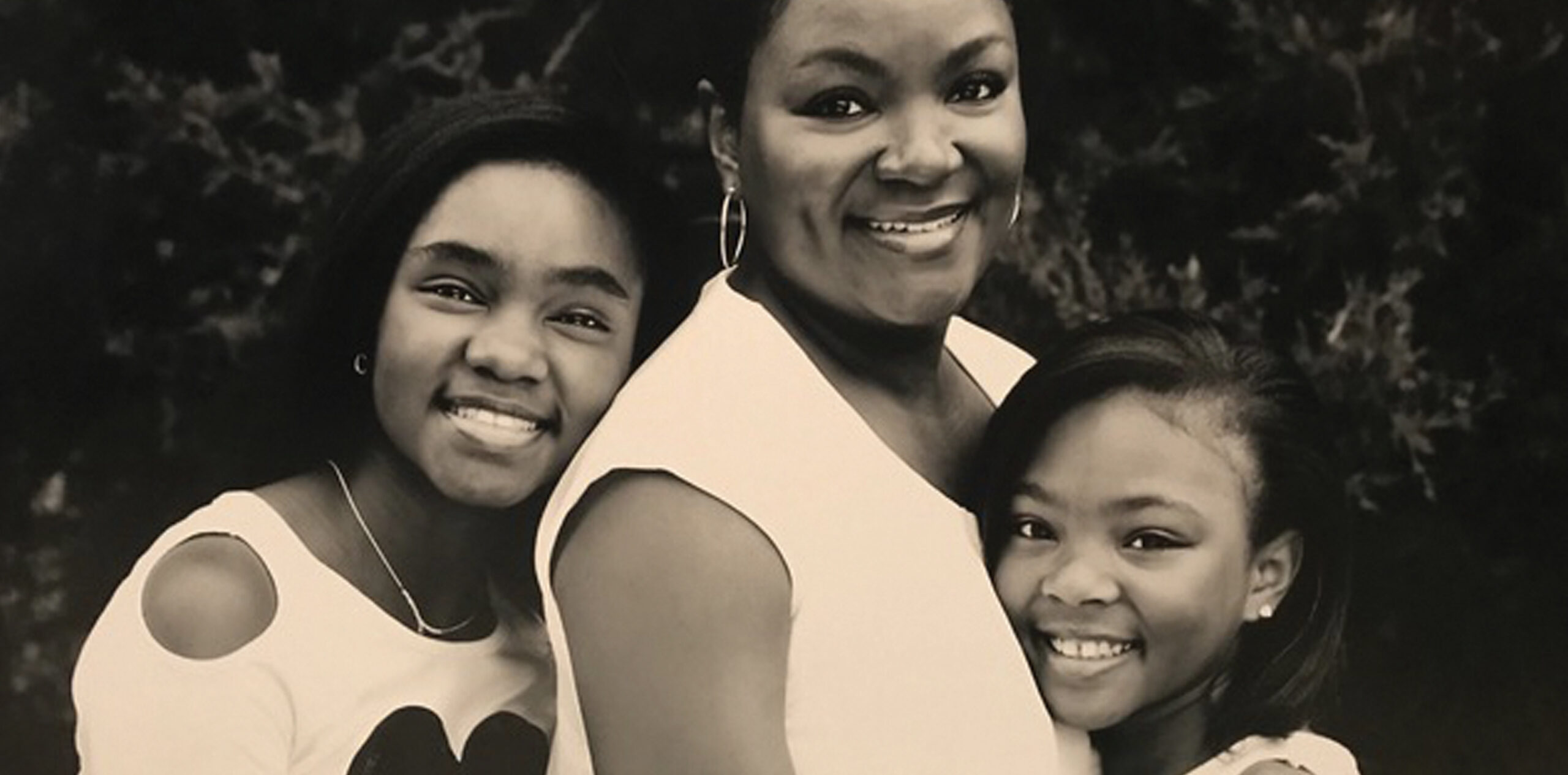
As busy as Reynolds is, she’s fastened to her daughters, snapping pictures at shows and concerts and sporting events. They attended her press conference about the track and field proposal. “I think I was going to have them stand up there with me,” she remembers. “But when I get nervous I forget everything I’m going to do.” So they watched from the audience. Sydney told her mother afterward: “I’m proud of you.”
I thought I had heard her say once that she planned to be at the Urban League until the day she died. When I ask her about that, she looks at me, puzzled. “Nah,” she says with a laugh. She’ll want some free time one of these days. She has zero plans for political office. She has turned down other opportunities presented to her.
At this point, Reynolds says, “I feel like the Urban League is my last stop,” a last chapter. All the footnotes bundled over 40-something years have prepared her for this role, for that cushioned bar stool under a soft box light next to a congressman. Not all have this platform. Slide on down. “Most people don’t have a job where a man rolling his little electric cart is jumping out to hug you and say, ‘Thank you. You make me proud.’ That is the best feeling in the world,” she says. “Especially older Black people who you know have been through so much and are so tired and watch the same news as I watch. So when they say thank you for representing us, there’s no award. There’s nothing that compares to that.”
This story originally appeared in print in December 2017.
Share This Article
We want to hear from you. Who or what should more Louisvillians know about? Share here.
